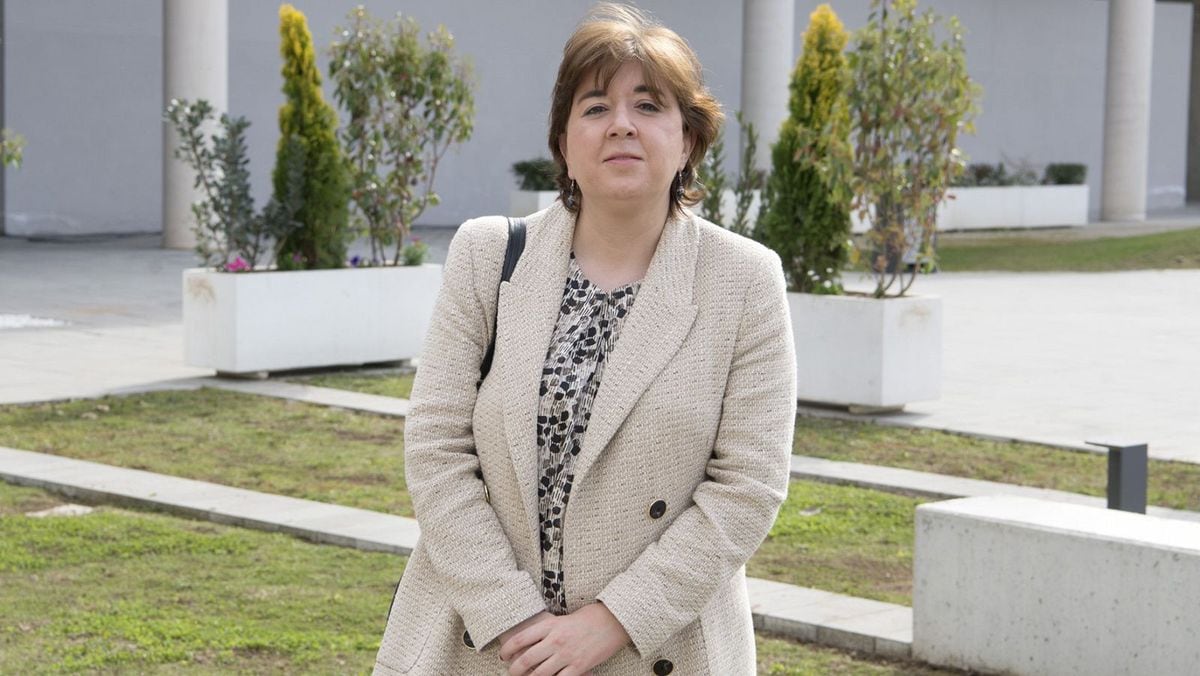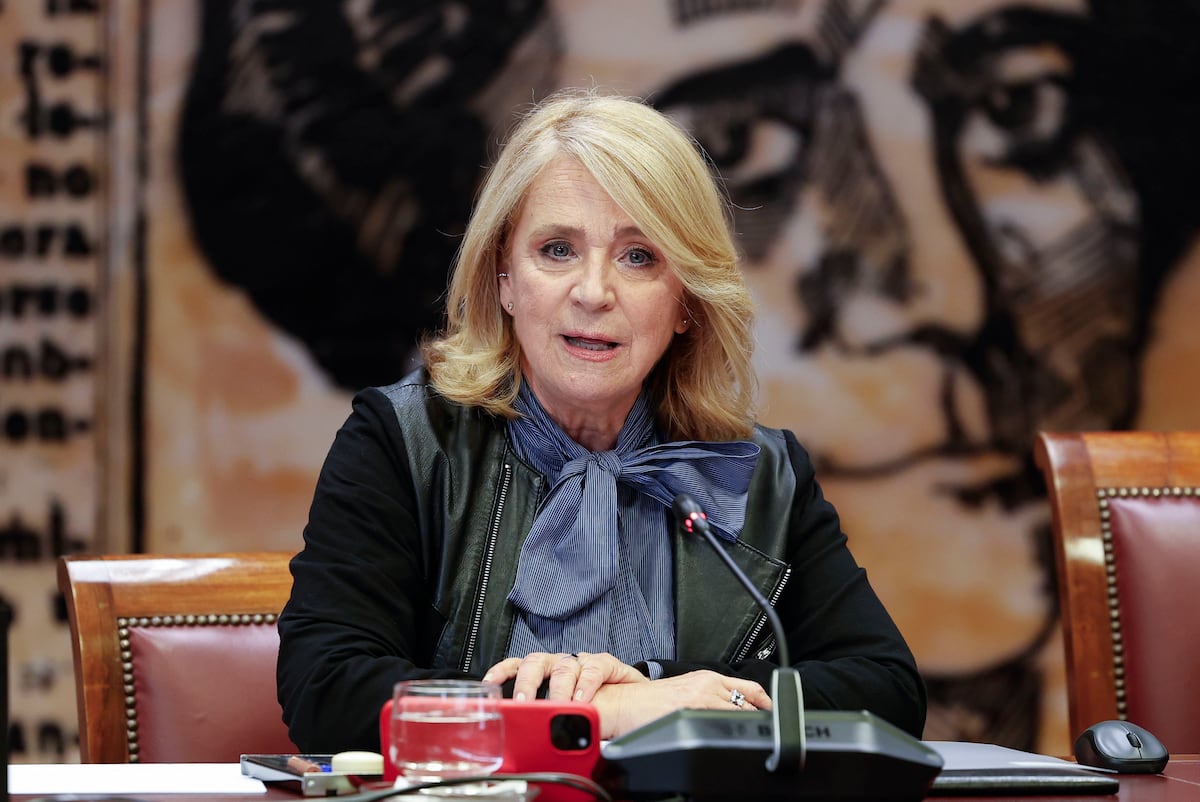The journalist and interim president of RTVE, Elena Sánchez, in a file image.RTVE/Raúl Tejedor (RTVE/EFE)
The Council of Ministers has approved this Tuesday a modification of the Social Statutes of Radiotelevisión Española (RTVE) to provide the new interim president of the board of directors, Elena Sánchez, with more powers to carry out her position.
The council of RTVE chose the journalist last week, but her functions as interim were very limited.
In order to grant him the powers of the presidency of the entity, and to have the possibility of performing powers related to the executive management, the Council of Ministers has agreed in its meeting the statutory modification.
More information
RTVE elects the journalist Elena Sánchez as interim president after the resignation of Tornero
The change in article 34 specifies that in cases of vacancy or absence, the president of the corporation will be replaced by the director who assumes the presidency of the council on an interim basis.
"The purpose of the modification is eminently explanatory", exposes the text of the Government.
In reality, it implies granting the interim president of the council some functions that until now, according to the Statutes that govern the operation of the company, she lacked.
The Government has authorized the modification of this regulation following a request from the State Industrial Participation Company (SEPI), shareholder of the radio and television corporation, which agreed to the measure at a meeting held on Monday, one day before the Council of Ministers .
Elena Sánchez will thus have in her hand the same executive powers as her predecessor, José Manuel Pérez Tornero, who last week presented his resignation from his position.
The difference between the two cases is that Pérez Tornero was elected, specifically, president of the corporation in the Congress of Deputies and Sánchez was voted exclusively as a member of the board of directors (both at the proposal of the PSOE).
With the change approved by the Council of Ministers, Sánchez will be able to make appointments and dismissals and also sign high-value contracts.
“As president of the council she had very few powers.
Modifying the statutes is the most operative”, explain company sources.
It is also the fastest way for Sánchez to have executive capacity.
Until now, a mechanism of this caliber had not been used on those occasions in which there was a vacancy in the presidency of RTVE.
Elena Sánchez acceded to the dome of the board of directors with the support of two advisers from the PSOE, two from United We Can and one from the PNV.
Authorizing the modification of the Statutes is the fast track so that Sánchez can manage the group without great ties.
The slow route, to which the Government has not wanted to resort, goes through the election of the tenth adviser of RTVE in the Congress of Deputies.
In addition to assuming the functions of the presidency of the corporation, Elena Sánchez will receive a remuneration adjusted to the regime of the highest officials and directors of the public sector.
The members of the board of directors are assigned allowances of 700 euros for attending meetings, which are usually held once a month.
Sánchez did not receive a special remuneration as president of the council, a situation that now, with new powers, she will change.
According to the data published on the Transparency portal, Pérez Tornero's salary amounted to 216,000 euros per year.
“Real scandal”
The PP hastened to describe the government's decision as a "genuine scandal", even before it had been officially announced.
The agreements of the Council of Ministers had not yet been communicated, when the popular spokesperson, Cuca Gamarra, in a statement in Congress, already warned against a maneuver that the popular inscribe in their thesis that the Government of Sánchez has "occupied" institutions such as the CIS, the National Institute of Statistics or the State Attorney General's Office, to which, according to them, RTVE would now be added.
Later, already in the Hemicycle, the PP deepened its accusations during the debate on a Citizens proposal to change the method of electing directors of the public corporation and allow parliamentary control of the Efe agency, which, unlike RTVE, is not now obliged to submit to this inspection.
“They are giving full powers to a person who is not going to go through this Parliament,” denounced the popular deputy Eduardo Carazo, who argued that in this way TVE will come under “the absolute control of another Sánchez, the one who is in La Moncloa”.
Accusations of partisan use of the public media were bouncing from one side of the chamber to the other during the debate.
The PSOE replied to those of the PP with the example of regional television where that party governs.
The socialist Tamara Raya recalled that the Government of Isabel Díaz Ayuso has reformed the law to have a free hand on Telemadrid and that in Galicia the workers of RTVG have been organizing "Black Fridays" for four years to denounce news manipulation.
Joan Mena, from United We Can, charged against Pérez Tornero, whom he accused of favoring the PP, while Guillermo Díaz, from Ciudadanos, distributed tow equally between the two major parties.
Díaz denounced that both forces have not only negotiated the distribution of positions, but also the names of the participants in the gatherings, and considered Pérez Tornero's departure as "the umpteenth stab of the political class" against the public entity.
Citizens' proposal is that a committee of experts hold a contest to examine the candidates for directors of RTVE and that the Courts then decide from those who were considered suitable.
The idea was not badly received by some formations usually very distant from Cs, such as EH Bildu or Más País, but neither PSOE nor PP gave it their support.
Later, already in the hemicycle, the PP deepened its accusations during the debate on a Citizens proposal to change the method of electing the directors of the public corporation and allow parliamentary control of the Efe agency, which, unlike RTVE, is not now obliged to submit to this inspection.

/cloudfront-eu-central-1.images.arcpublishing.com/prisa/W37GLZ62EKROOXFQVYY5FP3CHE.jpg)

/cloudfront-eu-central-1.images.arcpublishing.com/prisa/EMVMZ7U3KNFW5FQ5KGATJVCFCI.jpg)
/cloudfront-eu-central-1.images.arcpublishing.com/prisa/6T3KSOHA6BDQFBYIVNK745SWGM.jpg)

/cloudfront-eu-central-1.images.arcpublishing.com/prisa/VS4ONSPOPAREFUKG5AYIRYYO4E.jpg)
/cloudfront-eu-central-1.images.arcpublishing.com/prisa/5C635RG6YBGDPHDHXEOSQWFQ2Y.jpg)
